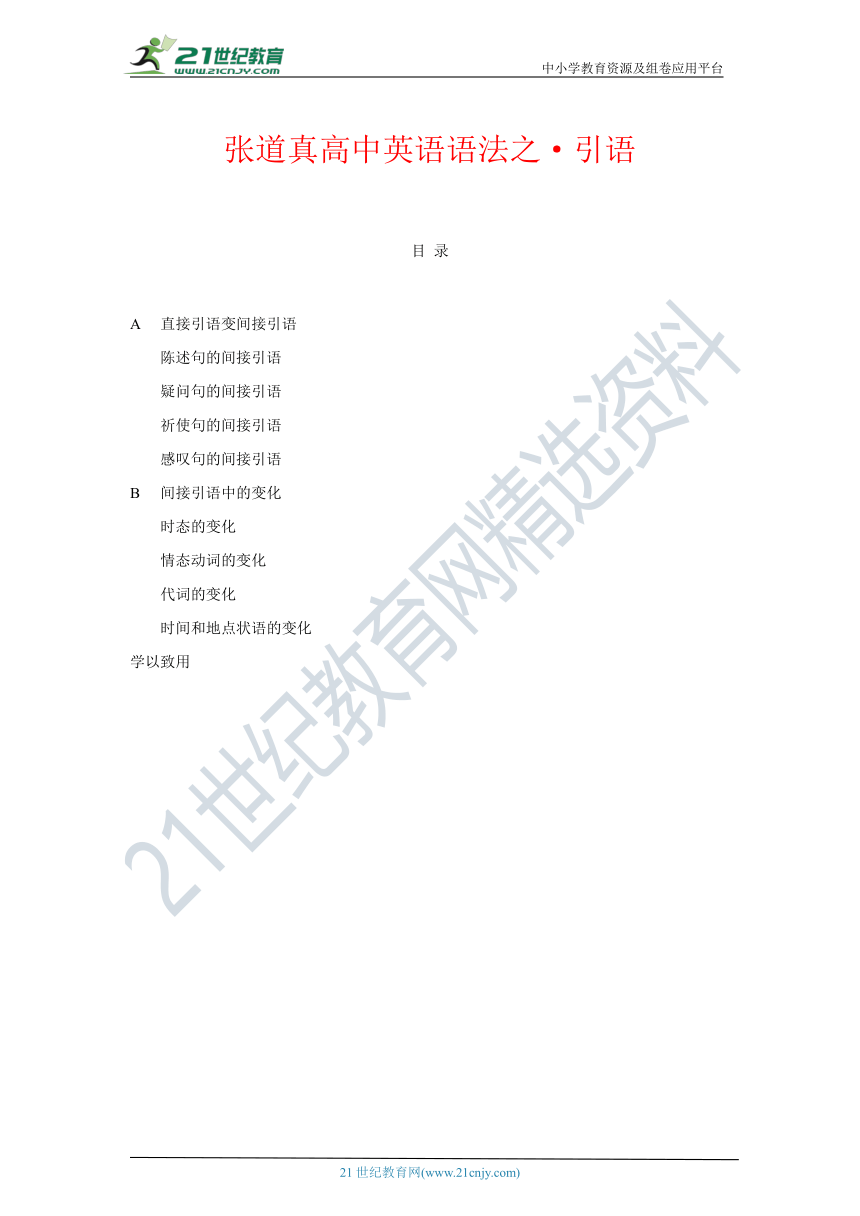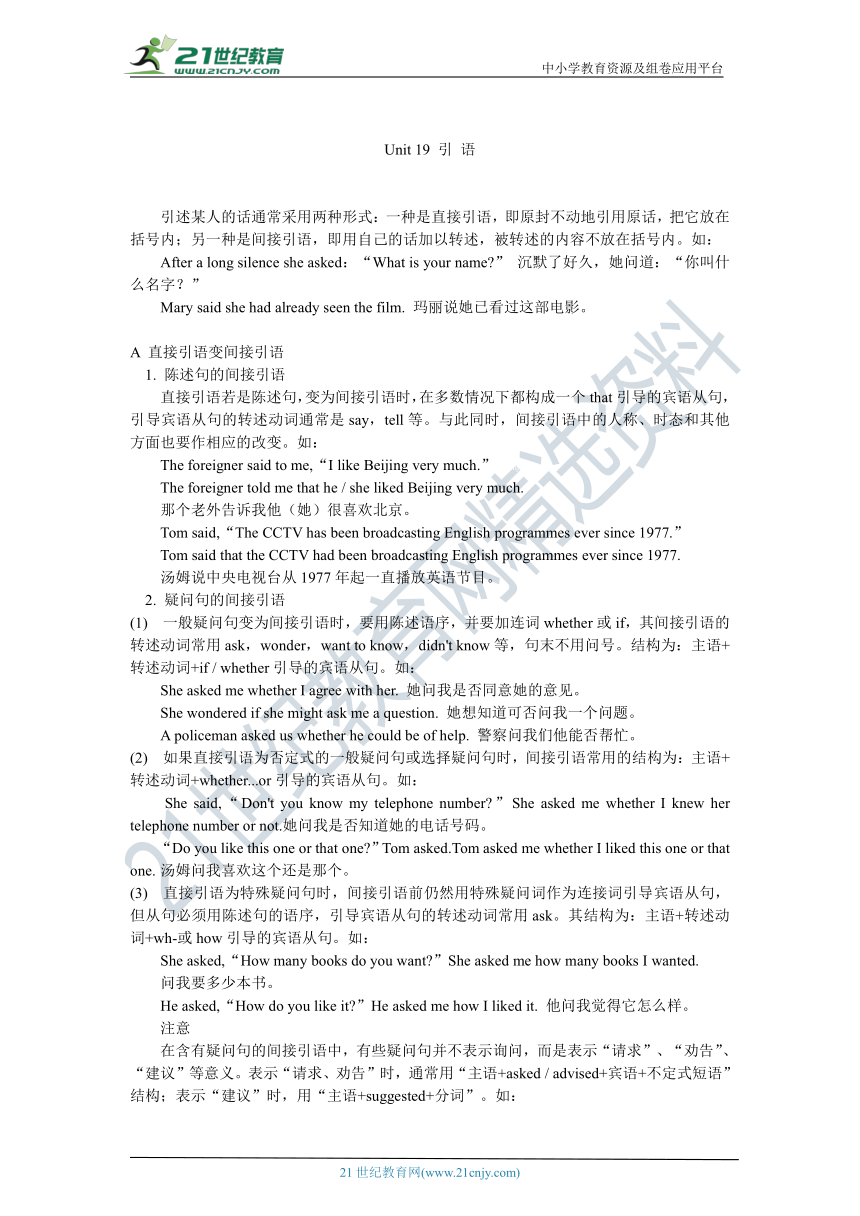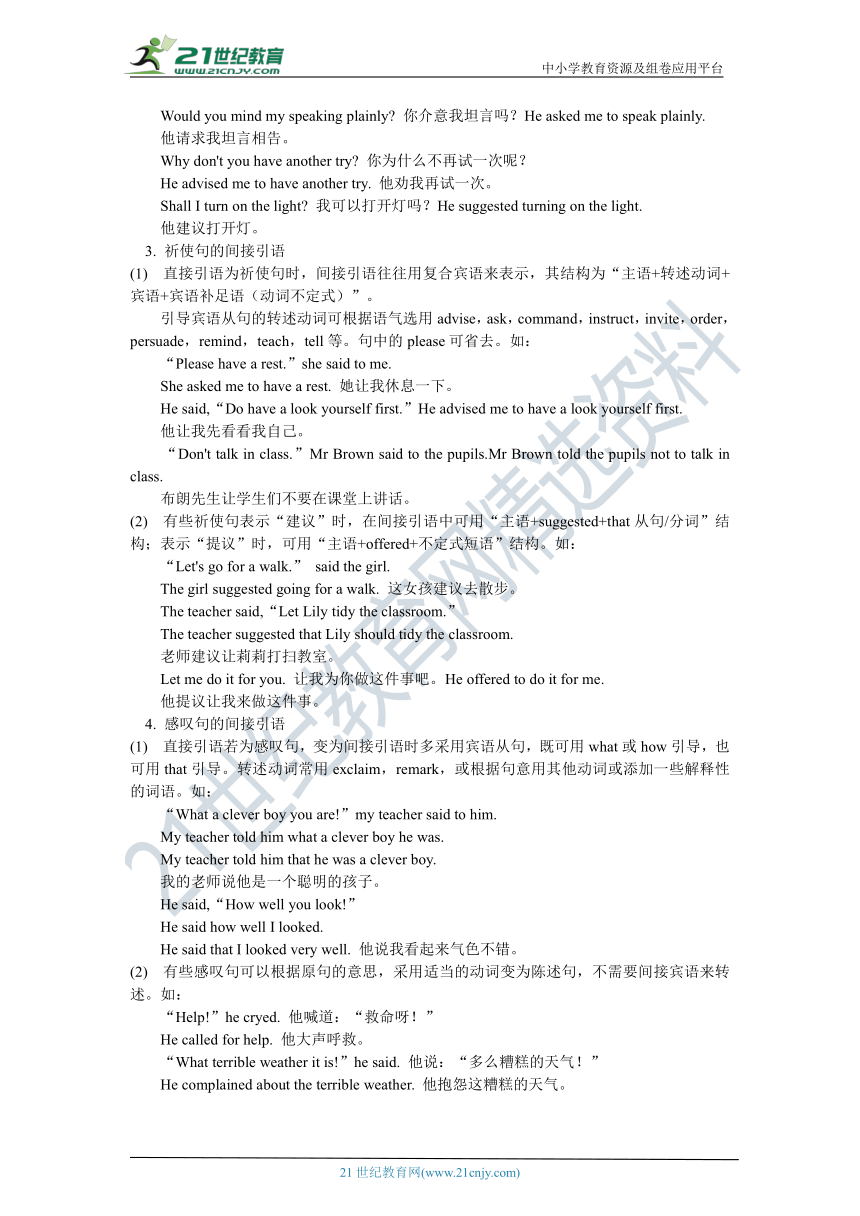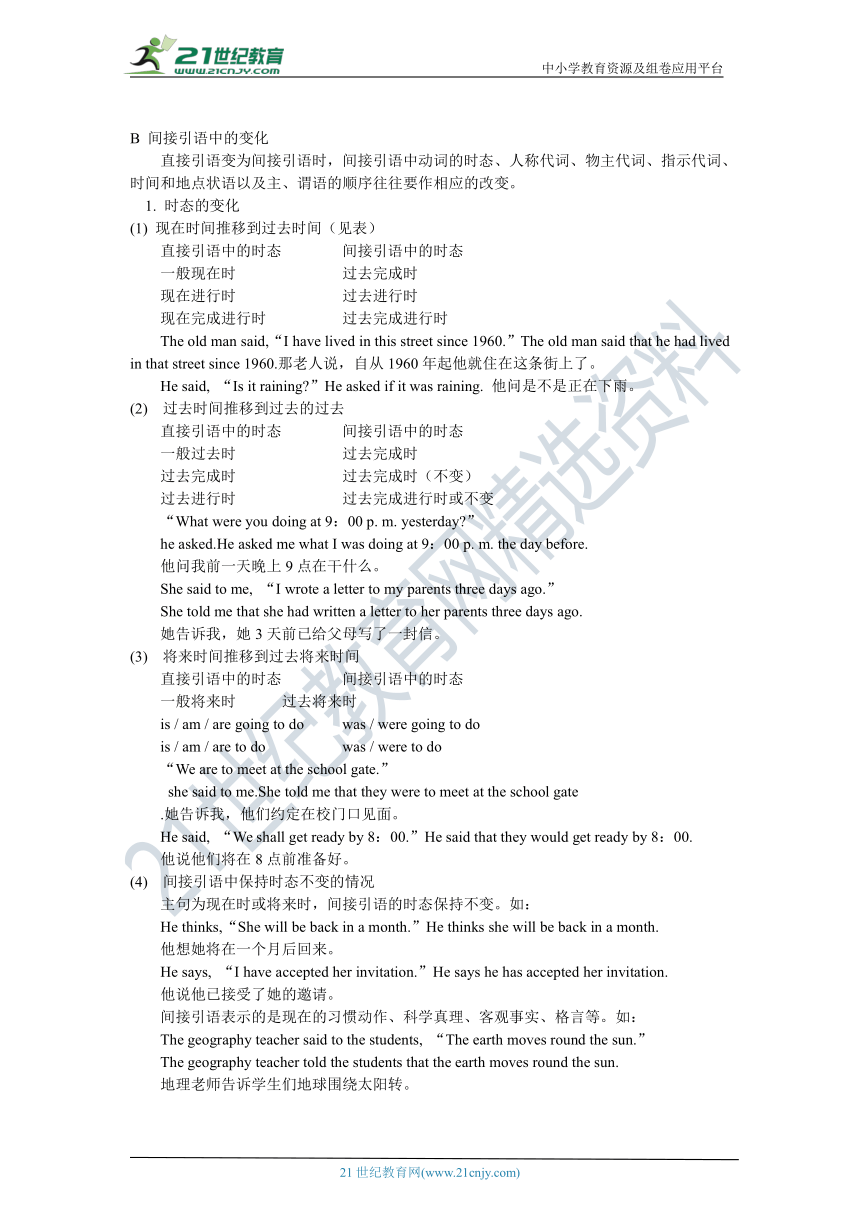高中英语语法之19引语
图片预览




文档简介
中小学教育资源及组卷应用平台
张道真高中英语语法之·引语
目 录
A 直接引语变间接引语
???? 陈述句的间接引语
???? 疑问句的间接引语
???? 祈使句的间接引语
???? 感叹句的间接引语
B 间接引语中的变化
???? 时态的变化
???? 情态动词的变化
???? 代词的变化
????时间和地点状语的变化
学以致用
Unit 19 引 语
引述某人的话通常采用_??¤?§?????????????_种是直接引语,即原封不动地引用原话,把它放在括号内;另一种是间接引语,即用自己的话加以转述,被转述的内容不放在括号内。如:
After a__long__silence she asked:“What is your name?” 沉默了好久,她问道:“你叫什么名字?”21教育网
Mary said she had already seen the film. 玛丽说她已看过这部电影。
A 直接引语变间接引语
1. 陈述句的间接引语
直接引语若是陈述句,变_???é????????è?????_,在多数情况下都构成一个that引导的宾语从句,引导宾语从句的转述动词通常是say,tell等。与此同时,间接引语中的人称、时态和其他方面也要作相应的改变。如:【来源:21·世纪·教育·网】
The foreigner said to me,“I like Beijing very much.”21*cnjy*com
The foreigner told me that he / she liked Beijing very much.
那个老外告诉我他(她)很喜欢北京。
Tom said,“Th_e_CCTV_ has been broadcasting English programmes ever since 1977.”
Tom sa_id_tha_t the CCTV had been broadcasting English programmes ever since 1977.
汤姆说中央电视台从1977年起一直播放英语节目。
2. 疑问句的间接引语
(1) 一般疑问句变_???é????????è?????_,要用陈述语序,并要加连词whether或if,其间接引语的转述动词常用ask,wonder,want to know,didn't know等,句末不用问号。结构为:主语+转述动词+if / whether引导的宾语从句。如:
She asked me whether I agree with her. 她问我是否同意她的意见。
She wondered if she might ask me a question. 她想知道可否问我一个问题。
A policeman asked us whether he could be of help. 警察问我们他能否帮忙。
(2) 如果直接引语为_???????????????è??_疑问句或选择疑问句时,间接引语常用的结构为:主语+转述动词+whether...or引导的宾语从句。如:
She sai_d,???Don_'t you know my telephone number?”She asked me whether I knew her telephone number or not.她问我是否知道她的电话号码。
“Do you like t_his_on_e or that one?”Tom asked.Tom asked me whether I liked this one or that one. 汤姆问我喜欢这个还是那个。21教育名师原创作品
(3) 直接引语为特殊疑问_?????????é????????_语前仍然用特殊疑问词作为连接词引导宾语从句,但从句必须用陈述句的语序,引导宾语从句的转述动词常用ask。其结构为:主语+转述动词+wh-或how引导的宾语从句。如:
She aske_d,???How_ many books do you want?”She asked me how many books I wanted.
问我要多少本书。
He as_ked,???H_ow do you like it?”He asked me how I liked it. 他问我觉得它怎么样。
注意
在含有疑问句的间_??????è???????????_些疑问句并不表示询问,而是表示“请求”、“劝告”、“建议”等意义。表示“请求、劝告”时,通常用“主语+asked / advised+宾语+不定式短语”结构;表示“建议”时,用“主语+suggested+分词”。如:
Would you _mind_m_y speaking plainly? 你介意我坦言吗?He asked me to speak plainly.
他请求我坦言相告。
Why don't you have another try? 你为什么不再试一次呢?
He advised me to have another try. 他劝我再试一次。
Shall I _turn_o_n the light? 我可以打开灯吗?He suggested turning on the light.
他建议打开灯。
3. 祈使句的间接引语
(1) 直接引语为祈使句时,间接引语往往用复合宾语来表示,其结构为“主语+转述动词+宾语+宾语补足语(动词不定式)”。【出处:21教育名师】
引导宾语从句的转述动词_?????????è???°?é??_用advise,ask,command,instruct,invite,order,persuade,remind,teach,tell等。句中的please可省去。如:
“Please have a rest.”she said to me.
She asked me to have a rest. 她让我休息一下。
He said_,???Do_h_ave a look yourself first.”He advised me to have a look yourself first.
他让我先看看我自己。
“Don't talk in__class_.”Mr Brown said to the pupils.Mr Brown told the pupils not to talk in class.
布朗先生让学生们不要在课堂上讲话。
(2) 有些祈使句表示“建议”_????????¨é????????_语中可用“主语+suggested+that从句/分词”结构;表示“提议”时,可用“主语+offered+不定式短语”结构。如:
“Let's go for a walk.” said the girl.
The girl suggested going for a walk. 这女孩建议去散步。
The teacher said,“Let Lily tidy the classroom.”
The teacher suggested that Lily should tidy the classroom. 21·世纪*教育网
老师建议让莉莉打扫教室。
Let me do it for you. 让我为你做这件事吧。He offered to do it for me.
他提议让我来做这件事。
4. 感叹句的间接引语
(1) 直接引语若为感叹句,变_???é????????è?????_多采用宾语从句,既可用what或how引导,也可用that引导。转述动词常用exclaim,remark,或根据句意用其他动词或添加一些解释性的词语。如:
“What a clever boy you are!”my teacher said to him.
My teacher told him what a clever boy he was.
My teacher told him that he was a clever boy.
我的老师说他是一个聪明的孩子。
He said,“How well you look!”
He said how well I looked.
He said that I looked very well. 他说我看起来气色不错。
(2) 有些感叹句可以根据原句的意思,采用适当的动词变为陈述句,不需要间接宾语来转述。如:
“Help!”he cryed. 他喊道:“救命呀!”
He called for help. 他大声呼救。
“What terrible weather it is!”he said. 他说:“多么糟糕的天气!”
He complained about the terrible weather. 他抱怨这糟糕的天气。
B 间接引语中的变化
直接引语变为间接引语时,间接引语中动词的时态、人称代词、物主代词、指示代词、时间和地点状语以及主、谓语的顺序往往要作相应的改变。
1. 时态的变化
(1) 现在时间推移到过去时间(见表)
直接引语中的时态 间接引语中的时态
一般现在时 过去完成时
现在进行时 过去进行时
现在完成进行时 过去完成进行时
The old ma_n_said_,“I have lived in this street since 1960.”The old man said that he had lived in that street since 1960.那老人说,自从1960年起他就住在这条街上了。
He said, “Is it raining?”He asked if it was raining. 他问是不是正在下雨。
(2) 过去时间推移到过去的过去
直接引语中的时态 间接引语中的时态
一般过去时 过去完成时
过去完成时 过去完成时(不变)
过去进行时 过去完成进行时或不变
“What were you doing at 9:00 p. m. yesterday?”
he asked.He asked me what I was doing at 9:00 p. m. the day before.
他问我前一天晚上9点在干什么。
She said to me, “I wrote a letter to my parents three days ago.”【来源:21cnj*y.co*m】
She told _me_tha_t she had written a letter to her parents three days ago.
她告诉我,她3天前已给父母写了一封信。
(3) 将来时间推移到过去将来时间
直接引语中的时态 间接引语中的时态
一般将来时 过去将来时
is / am / are going to do was / were going to do21世纪教育网版权所有
is / am / are to do was / were to do
“We are to meet at the school gate.”
she said to me.She told me that they were to meet at the school gate
.她告诉我,他们约定在校门口见面。
He said, “We s_hall_g_et ready by 8:00.”He said that they would get ready by 8:00.
他说他们将在8点前准备好。
(4) 间接引语中保持时态不变的情况
主句为现在时或将来时,间接引语的时态保持不变。如:
He thin_ks,???Sh_e will be back in a month.”He thinks she will be back in a month.
他想她将在一个月后回来。
He says, “I h_ave_ac_cepted her invitation.”He says he has accepted her invitation.
他说他已接受了她的邀请。
间接引语表示的是现在的习惯动作、科学真理、客观事实、格言等。如:
The geogr_aphy_t_eacher said to the students, “The earth moves round the sun.”
The geograph_y_teac_her told the students that the earth moves round the sun.
地理老师告诉学生们地球围绕太阳转。
He s_aid,???E_very dog has his day.”He said that every dog has his day. 他说人人皆有出头日。
间接引语中动词表示的动作说话时仍在进行或状态仍然存在,时态可保持不变。如:
Just now Mr Brow_n_said_,“My son is ill today.”Mr Brown told me just now that his son is ill today. 布郎先生刚才告诉我,他儿子今天病了。21·cn·jy·com
He said_,_???The_ window is borken.”He said that the window is broken. 他说窗户破了。
间接引语中有明确的过去时间状语,仍可用一般过去时,不必改为过去完成时。如:
“I was bor_n_in_1_980,” Julia said.Julia said that she was born in 1980.
朱莉娅说她是在1980年出生的。
2. 情态动词的变化
情态动词在间接引语_???é??????????????_过去式。must表示“必然、推测、禁止”等意思时,可不变;表示“必须”时,可不变,也可用had to或would have to。如:
“All men mu_st_die_.”the senior said. The senior said that all men must die.
那老者说人总是要死的。
She said, “I must go to see the doctor tomorrow afternoon.”
She said__that__she must / would have to go to see the doctor the next afternoon.
她说第二天下午她一定得去看医生。
He said,“We u_sed_to_ go there every year.”He told me that they used to go here every year.
他对我说过去每年他们都来这里。
3. 代词的变化
人称代词的变化
(1) 当主句的主语是第一人称时,间接引语中的人称代词不变。如:
I said,“_You_di_d quite well in the exam.”I said that you had done quite well in the exam. 我说你考得不错。2-1-c-n-j-y
(2) 直接引语的主语是第一人称,若改为间接引语,其人称与主句中主语的人称要保持一致。如:
He said to Tom,“I'll do my best to catch up with others.”
He told Tom that he would do his best to catch up with others.
他告诉汤姆他将尽他所能赶上其他人。
(3) 直接引语中主语是第二人称时,改为间接引语的人称和主句的宾语要保持一致。如:
He said to her,“Where did you put the glasses?”
He asked to her where she had put the glasses. 他问她把眼镜放哪儿了。
(4) 直接引语中主语是第三人称时,在改为间接引语时不发生变化。如:
He said__to_To_m, “She can help them.”He told Tom that she could help them.
他告诉汤姆她能够帮助他们。
注意
如果主句中无宾语,应根据语境或想象,添加适当的宾语;如果直接引语中有呼语,则将其改为主句谓语动词的宾语。如:
Mother asked,“Where have you been?”Mother asked me where I had been.
母亲问我去哪儿了。
“Why are y_ou_lat_e again, John?” the teacher asked.The teacher asked John why he was late again. 老师问约翰为什么又迟到了。
物主代词的变化
“You should__not_o_verlook your fault,”Mum said to me.Mum told me that I should not overlook my fault. 妈妈对我说,我不应该忽略我的缺点。
The tw_o_boys_ said, “We have lost our dog.”The two boys said that they had lost their dog.
这两个男孩说他们的狗丢了。
指示代词的变化
直接引语中的指示代词 间接引语中的指示代词
this (place) that (place)
these (places) those (places)
She said,“This is the house in which Lu Xun once lived.”21cnjy.com
She said that is the house in which Lu Xun had once lived.www-2-1-cnjy-com
她说那是鲁迅曾经住过的房子。
Jane said,“I bought these flowers for you.”
Jane said that she had bought those flowers for me.
简说那些花是她为我买的。
4. 时间和地点状语的变化
(1) 时间状语的变化
直接引语中的时间状语 间接引语中的时间状语
now then
today, tonight that day, that night
this week(month...) that week (month...)
yesterday the day before
last week (month...) the week (month...) before
two days (a year...) ago two days (a year...) before (earlier)
tomorrow the next (following) day
next week (month...) the next (following) week(month...)
so far by then
in 2009 in 2009
yesterday morning the morning before
He said ,“I arr_ived_y_esterday morning.”He said that he'd arrived the morning before.
他说他前一天早上就到达了。
She said,“My sister'll be back tomorrow evening.”
She said th_at_her_ sister would be back the following evening.她说她妹妹第二天晚上回来。
(2) 地点状语的变化
当直接引语变为间接引语时,地点状语here通常变为there,但如果说话人所在地点就是引述人所在地点,那么仍然可以使用here。如: 2·1·c·n·j·y
“Come here, please.”he said.He asked me to come here. 他叫我到这里来。
(引述人地点不变) He asked me to go there. 他叫我到那里去。
(引述人地点发生变化)
“Here she bur_st_int_o a flood of tears.”he said to me.He told me that she had burst into a flood of tears there.他告诉我,就在那个地方她放声大哭起来。21*cnjy*com
_21?????????è?????(www.21cnjy.com)_
张道真高中英语语法之·引语
目 录
A 直接引语变间接引语
???? 陈述句的间接引语
???? 疑问句的间接引语
???? 祈使句的间接引语
???? 感叹句的间接引语
B 间接引语中的变化
???? 时态的变化
???? 情态动词的变化
???? 代词的变化
????时间和地点状语的变化
学以致用
Unit 19 引 语
引述某人的话通常采用_??¤?§?????????????_种是直接引语,即原封不动地引用原话,把它放在括号内;另一种是间接引语,即用自己的话加以转述,被转述的内容不放在括号内。如:
After a__long__silence she asked:“What is your name?” 沉默了好久,她问道:“你叫什么名字?”21教育网
Mary said she had already seen the film. 玛丽说她已看过这部电影。
A 直接引语变间接引语
1. 陈述句的间接引语
直接引语若是陈述句,变_???é????????è?????_,在多数情况下都构成一个that引导的宾语从句,引导宾语从句的转述动词通常是say,tell等。与此同时,间接引语中的人称、时态和其他方面也要作相应的改变。如:【来源:21·世纪·教育·网】
The foreigner said to me,“I like Beijing very much.”21*cnjy*com
The foreigner told me that he / she liked Beijing very much.
那个老外告诉我他(她)很喜欢北京。
Tom said,“Th_e_CCTV_ has been broadcasting English programmes ever since 1977.”
Tom sa_id_tha_t the CCTV had been broadcasting English programmes ever since 1977.
汤姆说中央电视台从1977年起一直播放英语节目。
2. 疑问句的间接引语
(1) 一般疑问句变_???é????????è?????_,要用陈述语序,并要加连词whether或if,其间接引语的转述动词常用ask,wonder,want to know,didn't know等,句末不用问号。结构为:主语+转述动词+if / whether引导的宾语从句。如:
She asked me whether I agree with her. 她问我是否同意她的意见。
She wondered if she might ask me a question. 她想知道可否问我一个问题。
A policeman asked us whether he could be of help. 警察问我们他能否帮忙。
(2) 如果直接引语为_???????????????è??_疑问句或选择疑问句时,间接引语常用的结构为:主语+转述动词+whether...or引导的宾语从句。如:
She sai_d,???Don_'t you know my telephone number?”She asked me whether I knew her telephone number or not.她问我是否知道她的电话号码。
“Do you like t_his_on_e or that one?”Tom asked.Tom asked me whether I liked this one or that one. 汤姆问我喜欢这个还是那个。21教育名师原创作品
(3) 直接引语为特殊疑问_?????????é????????_语前仍然用特殊疑问词作为连接词引导宾语从句,但从句必须用陈述句的语序,引导宾语从句的转述动词常用ask。其结构为:主语+转述动词+wh-或how引导的宾语从句。如:
She aske_d,???How_ many books do you want?”She asked me how many books I wanted.
问我要多少本书。
He as_ked,???H_ow do you like it?”He asked me how I liked it. 他问我觉得它怎么样。
注意
在含有疑问句的间_??????è???????????_些疑问句并不表示询问,而是表示“请求”、“劝告”、“建议”等意义。表示“请求、劝告”时,通常用“主语+asked / advised+宾语+不定式短语”结构;表示“建议”时,用“主语+suggested+分词”。如:
Would you _mind_m_y speaking plainly? 你介意我坦言吗?He asked me to speak plainly.
他请求我坦言相告。
Why don't you have another try? 你为什么不再试一次呢?
He advised me to have another try. 他劝我再试一次。
Shall I _turn_o_n the light? 我可以打开灯吗?He suggested turning on the light.
他建议打开灯。
3. 祈使句的间接引语
(1) 直接引语为祈使句时,间接引语往往用复合宾语来表示,其结构为“主语+转述动词+宾语+宾语补足语(动词不定式)”。【出处:21教育名师】
引导宾语从句的转述动词_?????????è???°?é??_用advise,ask,command,instruct,invite,order,persuade,remind,teach,tell等。句中的please可省去。如:
“Please have a rest.”she said to me.
She asked me to have a rest. 她让我休息一下。
He said_,???Do_h_ave a look yourself first.”He advised me to have a look yourself first.
他让我先看看我自己。
“Don't talk in__class_.”Mr Brown said to the pupils.Mr Brown told the pupils not to talk in class.
布朗先生让学生们不要在课堂上讲话。
(2) 有些祈使句表示“建议”_????????¨é????????_语中可用“主语+suggested+that从句/分词”结构;表示“提议”时,可用“主语+offered+不定式短语”结构。如:
“Let's go for a walk.” said the girl.
The girl suggested going for a walk. 这女孩建议去散步。
The teacher said,“Let Lily tidy the classroom.”
The teacher suggested that Lily should tidy the classroom. 21·世纪*教育网
老师建议让莉莉打扫教室。
Let me do it for you. 让我为你做这件事吧。He offered to do it for me.
他提议让我来做这件事。
4. 感叹句的间接引语
(1) 直接引语若为感叹句,变_???é????????è?????_多采用宾语从句,既可用what或how引导,也可用that引导。转述动词常用exclaim,remark,或根据句意用其他动词或添加一些解释性的词语。如:
“What a clever boy you are!”my teacher said to him.
My teacher told him what a clever boy he was.
My teacher told him that he was a clever boy.
我的老师说他是一个聪明的孩子。
He said,“How well you look!”
He said how well I looked.
He said that I looked very well. 他说我看起来气色不错。
(2) 有些感叹句可以根据原句的意思,采用适当的动词变为陈述句,不需要间接宾语来转述。如:
“Help!”he cryed. 他喊道:“救命呀!”
He called for help. 他大声呼救。
“What terrible weather it is!”he said. 他说:“多么糟糕的天气!”
He complained about the terrible weather. 他抱怨这糟糕的天气。
B 间接引语中的变化
直接引语变为间接引语时,间接引语中动词的时态、人称代词、物主代词、指示代词、时间和地点状语以及主、谓语的顺序往往要作相应的改变。
1. 时态的变化
(1) 现在时间推移到过去时间(见表)
直接引语中的时态 间接引语中的时态
一般现在时 过去完成时
现在进行时 过去进行时
现在完成进行时 过去完成进行时
The old ma_n_said_,“I have lived in this street since 1960.”The old man said that he had lived in that street since 1960.那老人说,自从1960年起他就住在这条街上了。
He said, “Is it raining?”He asked if it was raining. 他问是不是正在下雨。
(2) 过去时间推移到过去的过去
直接引语中的时态 间接引语中的时态
一般过去时 过去完成时
过去完成时 过去完成时(不变)
过去进行时 过去完成进行时或不变
“What were you doing at 9:00 p. m. yesterday?”
he asked.He asked me what I was doing at 9:00 p. m. the day before.
他问我前一天晚上9点在干什么。
She said to me, “I wrote a letter to my parents three days ago.”【来源:21cnj*y.co*m】
She told _me_tha_t she had written a letter to her parents three days ago.
她告诉我,她3天前已给父母写了一封信。
(3) 将来时间推移到过去将来时间
直接引语中的时态 间接引语中的时态
一般将来时 过去将来时
is / am / are going to do was / were going to do21世纪教育网版权所有
is / am / are to do was / were to do
“We are to meet at the school gate.”
she said to me.She told me that they were to meet at the school gate
.她告诉我,他们约定在校门口见面。
He said, “We s_hall_g_et ready by 8:00.”He said that they would get ready by 8:00.
他说他们将在8点前准备好。
(4) 间接引语中保持时态不变的情况
主句为现在时或将来时,间接引语的时态保持不变。如:
He thin_ks,???Sh_e will be back in a month.”He thinks she will be back in a month.
他想她将在一个月后回来。
He says, “I h_ave_ac_cepted her invitation.”He says he has accepted her invitation.
他说他已接受了她的邀请。
间接引语表示的是现在的习惯动作、科学真理、客观事实、格言等。如:
The geogr_aphy_t_eacher said to the students, “The earth moves round the sun.”
The geograph_y_teac_her told the students that the earth moves round the sun.
地理老师告诉学生们地球围绕太阳转。
He s_aid,???E_very dog has his day.”He said that every dog has his day. 他说人人皆有出头日。
间接引语中动词表示的动作说话时仍在进行或状态仍然存在,时态可保持不变。如:
Just now Mr Brow_n_said_,“My son is ill today.”Mr Brown told me just now that his son is ill today. 布郎先生刚才告诉我,他儿子今天病了。21·cn·jy·com
He said_,_???The_ window is borken.”He said that the window is broken. 他说窗户破了。
间接引语中有明确的过去时间状语,仍可用一般过去时,不必改为过去完成时。如:
“I was bor_n_in_1_980,” Julia said.Julia said that she was born in 1980.
朱莉娅说她是在1980年出生的。
2. 情态动词的变化
情态动词在间接引语_???é??????????????_过去式。must表示“必然、推测、禁止”等意思时,可不变;表示“必须”时,可不变,也可用had to或would have to。如:
“All men mu_st_die_.”the senior said. The senior said that all men must die.
那老者说人总是要死的。
She said, “I must go to see the doctor tomorrow afternoon.”
She said__that__she must / would have to go to see the doctor the next afternoon.
她说第二天下午她一定得去看医生。
He said,“We u_sed_to_ go there every year.”He told me that they used to go here every year.
他对我说过去每年他们都来这里。
3. 代词的变化
人称代词的变化
(1) 当主句的主语是第一人称时,间接引语中的人称代词不变。如:
I said,“_You_di_d quite well in the exam.”I said that you had done quite well in the exam. 我说你考得不错。2-1-c-n-j-y
(2) 直接引语的主语是第一人称,若改为间接引语,其人称与主句中主语的人称要保持一致。如:
He said to Tom,“I'll do my best to catch up with others.”
He told Tom that he would do his best to catch up with others.
他告诉汤姆他将尽他所能赶上其他人。
(3) 直接引语中主语是第二人称时,改为间接引语的人称和主句的宾语要保持一致。如:
He said to her,“Where did you put the glasses?”
He asked to her where she had put the glasses. 他问她把眼镜放哪儿了。
(4) 直接引语中主语是第三人称时,在改为间接引语时不发生变化。如:
He said__to_To_m, “She can help them.”He told Tom that she could help them.
他告诉汤姆她能够帮助他们。
注意
如果主句中无宾语,应根据语境或想象,添加适当的宾语;如果直接引语中有呼语,则将其改为主句谓语动词的宾语。如:
Mother asked,“Where have you been?”Mother asked me where I had been.
母亲问我去哪儿了。
“Why are y_ou_lat_e again, John?” the teacher asked.The teacher asked John why he was late again. 老师问约翰为什么又迟到了。
物主代词的变化
“You should__not_o_verlook your fault,”Mum said to me.Mum told me that I should not overlook my fault. 妈妈对我说,我不应该忽略我的缺点。
The tw_o_boys_ said, “We have lost our dog.”The two boys said that they had lost their dog.
这两个男孩说他们的狗丢了。
指示代词的变化
直接引语中的指示代词 间接引语中的指示代词
this (place) that (place)
these (places) those (places)
She said,“This is the house in which Lu Xun once lived.”21cnjy.com
She said that is the house in which Lu Xun had once lived.www-2-1-cnjy-com
她说那是鲁迅曾经住过的房子。
Jane said,“I bought these flowers for you.”
Jane said that she had bought those flowers for me.
简说那些花是她为我买的。
4. 时间和地点状语的变化
(1) 时间状语的变化
直接引语中的时间状语 间接引语中的时间状语
now then
today, tonight that day, that night
this week(month...) that week (month...)
yesterday the day before
last week (month...) the week (month...) before
two days (a year...) ago two days (a year...) before (earlier)
tomorrow the next (following) day
next week (month...) the next (following) week(month...)
so far by then
in 2009 in 2009
yesterday morning the morning before
He said ,“I arr_ived_y_esterday morning.”He said that he'd arrived the morning before.
他说他前一天早上就到达了。
She said,“My sister'll be back tomorrow evening.”
She said th_at_her_ sister would be back the following evening.她说她妹妹第二天晚上回来。
(2) 地点状语的变化
当直接引语变为间接引语时,地点状语here通常变为there,但如果说话人所在地点就是引述人所在地点,那么仍然可以使用here。如: 2·1·c·n·j·y
“Come here, please.”he said.He asked me to come here. 他叫我到这里来。
(引述人地点不变) He asked me to go there. 他叫我到那里去。
(引述人地点发生变化)
“Here she bur_st_int_o a flood of tears.”he said to me.He told me that she had burst into a flood of tears there.他告诉我,就在那个地方她放声大哭起来。21*cnjy*com
_21?????????è?????(www.21cnjy.com)_
